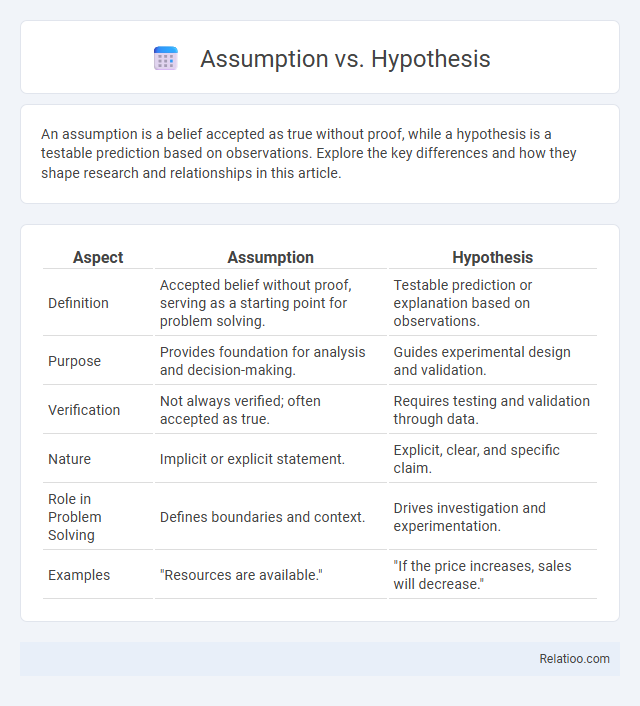An assumption is a belief accepted as true without proof, while a hypothesis is a testable prediction based on observations. Explore the key differences and how they shape research and relationships in this article.
Table of Comparison
| Aspect | Assumption | Hypothesis |
|---|---|---|
| Definition | Accepted belief without proof, serving as a starting point for problem solving. | Testable prediction or explanation based on observations. |
| Purpose | Provides foundation for analysis and decision-making. | Guides experimental design and validation. |
| Verification | Not always verified; often accepted as true. | Requires testing and validation through data. |
| Nature | Implicit or explicit statement. | Explicit, clear, and specific claim. |
| Role in Problem Solving | Defines boundaries and context. | Drives investigation and experimentation. |
| Examples | "Resources are available." | "If the price increases, sales will decrease." |
Introduction to Assumptions and Hypotheses
Assumptions serve as foundational premises accepted without proof, guiding the initial framework of a study or argument, while hypotheses are specific, testable predictions derived from these premises. Both assumptions and hypotheses play crucial roles in the scientific method, with assumptions establishing the context and hypotheses driving empirical investigation. Clear differentiation between these concepts enhances the rigor of research design and the validity of conclusions.
Defining Assumptions: Meaning and Examples
Assumptions are foundational beliefs accepted as true without empirical proof, serving as starting points in reasoning or research. For example, in a scientific study, assuming a controlled environment remains constant allows for isolating variables and testing hypotheses effectively. Clearly defining assumptions, such as assuming participants answer surveys honestly, helps in clarifying the scope and limitations of any analysis or experiment.
What Is a Hypothesis? Key Features and Types
A hypothesis is a testable prediction or statement that explains a phenomenon, serving as the foundation for scientific experiments. Key features of a hypothesis include being specific, measurable, and falsifiable, allowing researchers to confirm or refute it through empirical evidence. Common types of hypotheses include null hypotheses, which propose no effect or relationship, and alternative hypotheses, which suggest a predicted effect or relationship.
Core Differences Between Assumptions and Hypotheses
Assumptions are treated as accepted truths without requiring proof, forming the foundation for further reasoning or analysis. Hypotheses are testable statements or predictions that you can validate through experimentation or observation. Understanding the core difference between assumptions and hypotheses is essential to effectively differentiate between what is taken for granted and what is subject to scientific testing in your research.
The Role of Assumptions in Research and Analysis
Assumptions form the foundational basis in research and analysis by providing accepted truths that guide the development of hypotheses and the interpretation of data. While hypotheses are testable predictions derived from existing knowledge, assumptions remain untested beliefs essential for framing your study's scope and methodology. Clear identification and validation of assumptions enhance the rigor and reliability of your research outcomes.
The Importance of Hypotheses in Scientific Inquiry
Hypotheses serve as testable predictions that guide scientific inquiry by providing a clear framework for experimentation and observation. Unlike assumptions, which are accepted without evidence, hypotheses require validation through empirical data and rigorous testing. This process enables researchers to refine theories, identify causal relationships, and advance knowledge systematically.
How Assumptions Influence Hypothesis Formulation
Assumptions serve as the foundational beliefs that shape how hypotheses are formulated by providing the initial context and conditions considered true without evidence. Your hypothesis builds upon these assumptions, guiding the direction of research and determining which variables are tested or controlled. Accurate assumptions lead to more precise hypotheses, thereby enhancing the reliability and validity of experimental outcomes.
Testing Assumptions vs. Testing Hypotheses
Testing assumptions involves verifying underlying beliefs or conditions that must hold true for a model or experiment to be valid, often using preliminary data or domain expertise. Testing hypotheses focuses on evaluating specific, testable predictions derived from theories through statistical analysis of collected data to confirm or refute those predictions. Your research accuracy depends on distinguishing these processes to ensure valid conclusions and robust experimental design.
Common Mistakes: Confusing Assumptions with Hypotheses
Common mistakes often arise when confusing assumptions with hypotheses, as assumptions are accepted truths without direct evidence, serving as foundational premises in reasoning or experiments. Hypotheses, in contrast, are testable statements or predictions formulated to be empirically evaluated through experimentation or observation. Misidentifying assumptions as hypotheses can lead to flawed experimental design and misinterpretation of data, impacting the validity of research outcomes.
Conclusion: Best Practices for Using Assumptions and Hypotheses
Effective use of assumptions and hypotheses requires clear differentiation: assumptions are accepted truths without proof, while hypotheses are testable predictions derived from theory or observation. Best practices involve explicitly stating assumptions to frame the context and rigorously testing hypotheses through empirical evidence to validate conclusions. Proper documentation and continuous reevaluation of both enhance the reliability and validity of research outcomes and decision-making processes.

Infographic: Assumption vs Hypothesis
 relatioo.com
relatioo.com